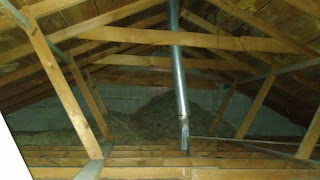So. We'll try to somewhat kinda sorta cover it in a few hundred words.
Basically, and this won't be a surprise to anyone, but there are a few basic rules with inspecting and maintaining your plumbing system. They go something like this:
- Water runs downhill.
- Water that runs downhill that stays in your house causes problems.
Let's start with exhibit one for the prosecution. Water runs pretty well through pipes, especially when the pipes run downhill, but add electrician's tape to the mix? Yeah, things stop working so well. This is like trying to fix a broken arm using a stapler and screwdriver. And if you're not guilty of this? Well, your grandpa did it. I see it everywhere. Don't. Just don't.
Exhibit B. Have you ever had one of those real juicy whiffs of sewer smell? I know that stuff in the toilet smells bad when you flush it, but what exactly happens to it to make it so nasty after it's been fermenting in the sewer lines? By the way, those gases not only smell bad, but they're not good for you. If you have sewer smells, look for a trap that might have evaporated water out of it. Or - look for one of these items. Yeah - not good.
Exhibit C. Leaving the hose on the hose bib during the winter causes problems. What kind of problems? Well, how about a wet basement or crawl space when you turn the hose on in the spring? What happens? Well, the hose freezes in the winter, and freezes the water in the faucet. It freezes back in a ways, but you don't get to find about it until you turn the valve in the spring/summer. Then the water hits the fan and you have a mold problem. $10 fix? This time it's free - keep your hose off the hose bib during the winter. $10,000 fix? Calling the disaster cleanup crew after your basement floods. I advise the first fix. If you have lots of money and don't care, I advise you just do the $10 fix anyway and send the rest ($9,990) to me. I'll put it to good use.
D. Sewer traps are there for a reason. Do you remember what I said above about the whole sewer smell thing? Yeah. That's why the traps are there - the water provides an air barrier against those sulphur smells.
Oh and by the way, if you don't know what you're doing? Don't do plumbing. Don't do electrical either. That will certainly result in the $10k fix - or the morgue. Either way, it's not good.
And now for a few more plumbing follies: don't do any of the above
 |
| Remember the whole water flowing down hill thing? Yeah - this ain't gonna work too well |
 |
| Holding |

































